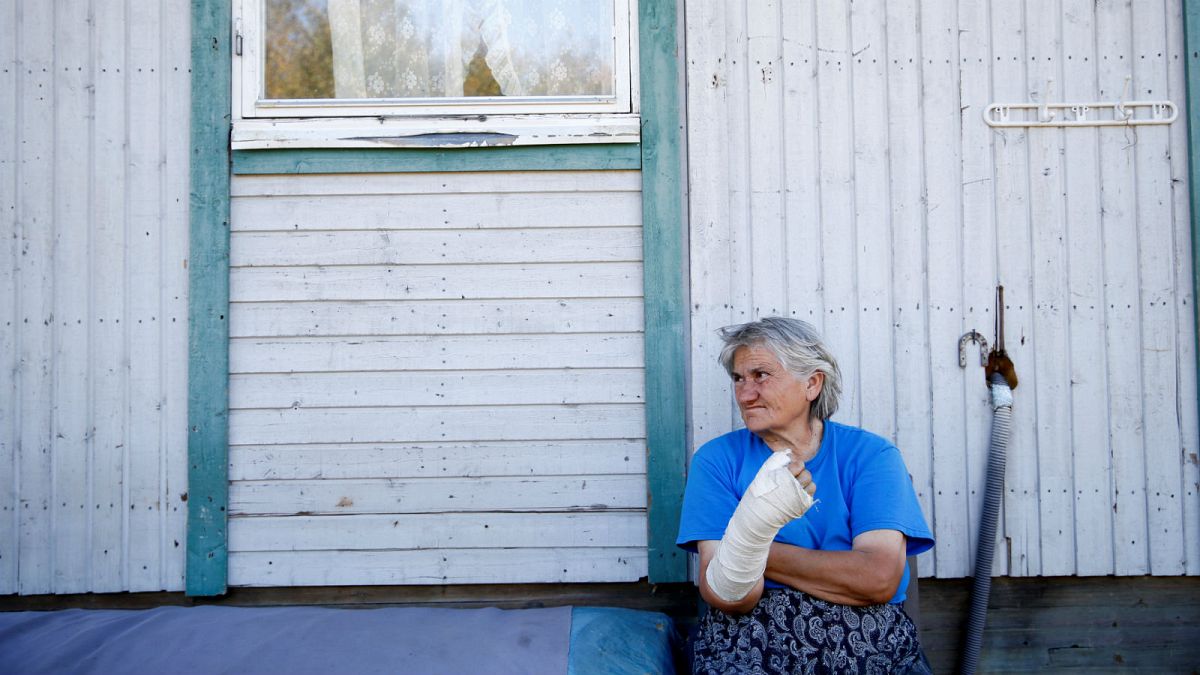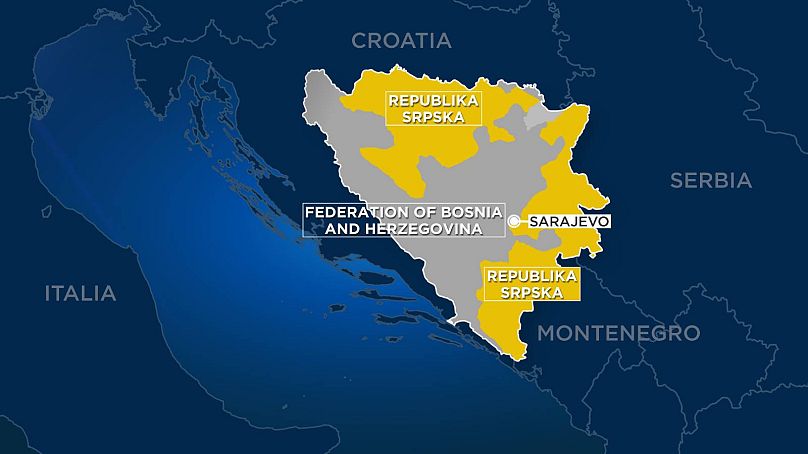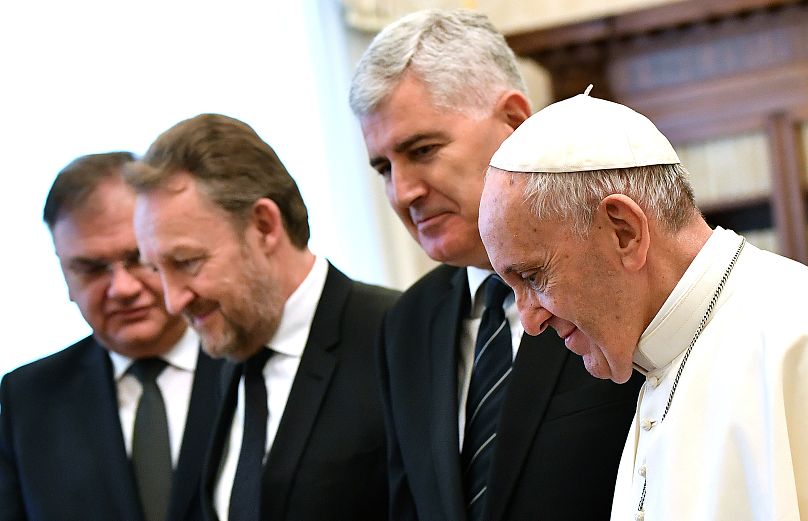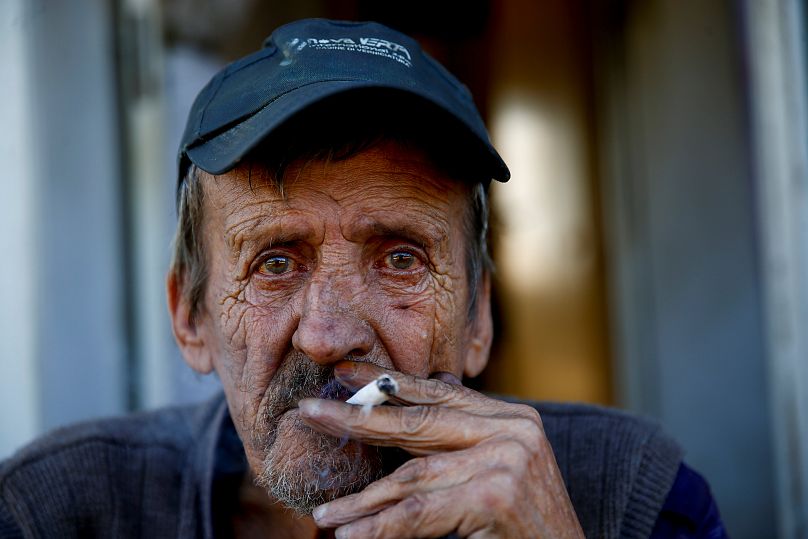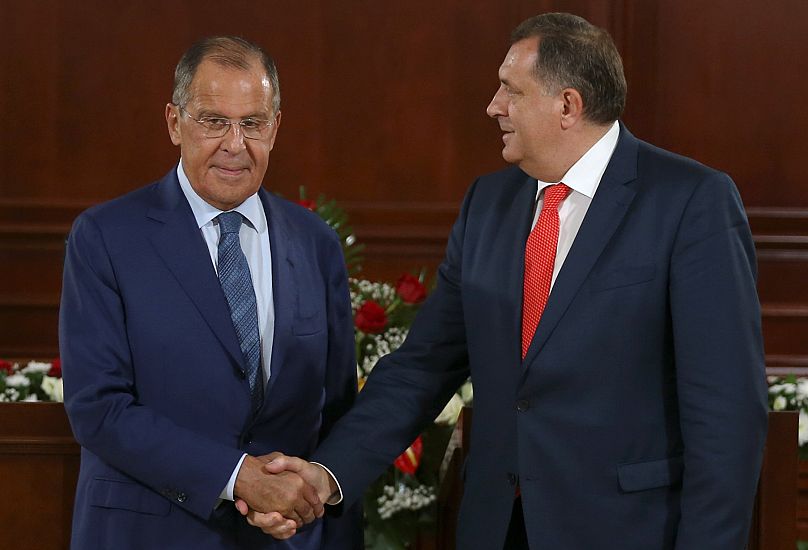Bosnia has Europe's most complex system of government and it's going to the polls on Sunday.
What is happening?
Get your paracetamol ready: the country with Europe’s most complex system of government is holding elections on Sunday.
Bosnia and Herzegovina is heading to the polls as dire unemployment and corruption continue to instigate a national brain drain.
Experts say it is being driven by too much focus on the ethnic divisions that fuelled a 1990s civil war and not enough on providing basic services.
How does Bosnia’s system of government work and why is it so complicated?
The system is a legacy of the peace deal that ended the 1992-95 conflict, which pitted Bosnia’s Serbs against its Croats and Muslims.
It will vote for a new national presidency and parliament much like you would expect in most other European states.
But the country is also split into two so-called entities: the Federation of Bosnia and Herzegovina, home to the Muslim-majority Bosniaks and Croats, and Republika Srpska, for the Serb population.
Presidents and parliaments for both these entities will be elected following Sunday’s vote.
The federation is also divided into a further 10 cantons, each with their own assembly and government.
Even the national presidency is a compromise.
Instead of having one president, the office is a shared, three-member body. One represents Bosniaks, another its Croats and the third its Serbs.
Who are the main runners and riders?
The national presidency — the country’s outward face — is arguably the most high-profile position.
More than a dozen candidates are in the running to fill the three positions.
Running to represent Bosnia’s Serb population is the incumbent Mladen Ivanic and the favourite Milorad Dodik. The latter has been campaigning for greater autonomy and eventual secession of the Serb-dominated region.
Dragan Covic is hoping to win the vote of Bosnia’s Croat population and, in the same vein as Dodik, wants the creation of a separate Croat-run region. His opponents include anti-nationalist candidate Zeljko Komsic.
Bosniaks are likely to choose either Sefik Dzaferovic or Fahrudin Radoncic, according to Jasmin Mujanovic, an expert on Bosnian politics.
Radoncic, a media mogul sometimes referred to as the 'Bosnian Berlusconi', is the favourite but he and his party have links to organised crime, according to Mujanovic.
Meanwhile Dzaferovic is from the same party as incumbent Bakir Izetbegovic, who is stepping down after reaching the maximum limit he can be in office for.
What are the main issues?
Bosnia’s youth unemployment stood at 54.8% last year and this, together with widespread corruption, is pushing people to migrate.
The country's healthcare system is collapsing, public infrastructure is struggling and education is in a downward spiral, experts say.
They paint a bleak picture of the problems affecting the country but claim none of them are likely to influence how people vote on Sunday.
“There is a catastrophic brain drain that has only accelerated over the last four years and all the parties have now started talking about it,” said Mujanovic. “It’s compounded by a declining birth rate and we’re facing demographic collapse in the very near term.
“But in practice these issues are not discussed in a meaningful fashion. Political discourse remains steeped in nationalist brinkmanship, paranoia and chauvinism.
“Among the nationalist parties at least, the main campaign issues are either ‘we're going to kill the other side or we’re going to keep you from getting killed by the other side’.”
Alida Vracic, a political scientist and founder of the think-tank Populari, told Euronews voter apathy and patronage politics meant little is likely to change going forward.
“It’s a matter of civic society waking up and demanding things,” she said. “People outside of Bosnia are active about every issue that bothers them. The way to do it is to put more pressure on the government, I don’t think we do enough of it.
“Unless there is pressure on the government they won’t deliver, why would they? This makes them extremely comfortable because the threshold is low. In a country as fragile as Bosnia that was at war in the 1990s it seems you don’t have to deliver anything as a politician and you still remain in power.”
How bad is corruption in Bosnia?
The run-up to the election has seen an unprecedented spate of campaigning violations, abuse of public funds and hate speech, anti-corruption watchdog Transparency International (TI) said on Thursday.
The campaign has been awash with the sort of divisive ethnic rhetoric that helped trigger the 1992-95 war, raising doubts on whether the country will be able to pursue a path towards European Union and NATO membership after the vote, it said.
Officials in the main Serb, Croat, and Bosniak Muslim parties have also sought to "buy" votes from public employees by opening new public roads and offering free medical check-ups, and threatening those who reject the blandishments, the Bosnian branch of Transparency International said in a report.
"Party functions have totally merged with public functions," said TI Bosnia programme manager Ivana Korajlic, adding that there had not been such a blatantly dirty election campaign since the 1990s war.
"The abuses have been conducted in the most open manner ever. Direct threats and attacks, pressures on voters and vote-buying, which in the past had been somehow subtle, have become fully transparent. There are no attempts even to conceal them."
Is there any hope for Bosnia?
Mujanovic, a political scientist from Elon University in North Carolina, said the situation is unlikely to improve while Covic and Dodik have a grip on Bosnian politics.
He said both obstruct much-needed reforms and are keen on protecting the de facto fiefdoms in their respective regions.
After the war, Dodik was a welcome new face in Bosnia when he first took office in 1998, especially for the EU and US.
He lost power but came back in 2006 transformed, emerging as a more extreme, nationalist figure, according to Mujanovic.
“It’s at the point now that he is arguably on par with the kind of rhetoric that we heard from the likes of Radovan Karadzic in the 1990s.
“He routinely and daily negates not just a genocide in Srebrenica but that there was any kind of war crimes committed by the Serb nationalist forces.”
“He is not a guy that is going to give up power peacefully, he’s not a guy that is going to abide by the results of the elections and he’s deeply and profoundly deepening his relationship with the Russians.”
Can things possibly improve?
“In so much as Bosnia is a failed state, it is a failed state by design,” said Mujanovic. “That's due in no small part of the Dayton Accords, even though they were necessary at the time.
“But the international community, and in particular the EU, has completely abandoned the idea of substantive constitutional and political reform in Bosnia. And that’s played directly into the hands of these malign, entrenched and reactionary political figures.
“It’s very difficult at this point to see a way forward. To my mind you need a very concerted battle or war against organised crime and corruption. Because that is ultimately how you get these people out of power and create the means and capacity for a slow, piecemeal reform process."
Your view | What do you think? Do you recognise the picture painted by these experts? Or is it wide of the mark? Let me know: chris.harris@euronews.com
